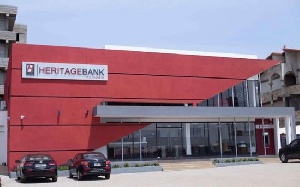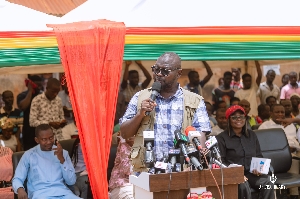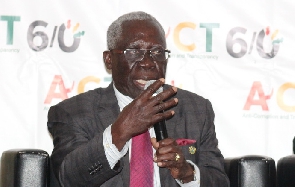Documents intercepted by your authoritative ABC NEWS has revealed how Seidu Agongo dribbled Bank of Ghana in a clear case of GhC30m round tripping to secure a license to set up now defunct Heritage Bank.
According to the document prepared by Kroll and Associates, Seidu Agongo and partners first applied for a Banking License but it was rejected because one proposed shareholder, Sarago Ltd had failed to show it had sufficient funds by 30th September, 2015.
A second application however, was made and accepted on 16th November, 2015.
Explaining in detail how the second application went through, Kroll in its confidential report noted that “Ghc30m paid by COCOBOD to an Agongo owned company moved from one shareholder account to another to provide statements of wealth that appear to show shareholders combined hold Ghc107 in cash”.
The shareholders of Heritage Bank were Seidu Agongo(55%), Sarago Ltd (20), Ms Fatima Adamu(15) and Sylvanus Kotey (10).
Giving a chronology of the questionable bank transactions, the report revealed that on 12th October, 2015, COCOBOD paid Ghc37.9m into the account of Alive Industries for the supply of Acati Power insecticide. Alive Industries then transfers Ghc30m from the COCOBOD cash to the account of Sarago Ltd on 21st October, 2015. “Sarago then provides a Statement showing this money in its account to BSD”, the report stated.
Something interesting happened on the day the amount hit the account of Sarago.
“After the statement of account has been processed, on the same day, the Ghc30m is then transferred from Sarago’s Unibank account back to Alive Industries account.”
On 22nd October, 2015, “The GHC30M is then split – Alive Industries pays out GHC18M to Fatimatu Adamu’s account at Stanbic Bank. Fatimatu Adamu then provides a statement showing this money in its account to BSD”
On the same day Alive Industries pays out Ghc18m to Fatima Adamu, it pays out Ghc12m to Sylvanus Kotey’s account at Stanbic Bank. ” Sylvanus Kotey then provides a statement showing this money in its account to BSD.”
The Ghc30M round tripping didn’t end there.
On 30th October, according to the report, Fatima Adamu transfers into the account of Agricult at Stanbic Bank, the Ghc18M it received from Alive Industries.
Kotey pays Ghc12m to a different account at Stanbic Bank belonging to Agricult.
On 2nd November, “Agricult transfers Ghc32m to Seidu Agongo’s bank Account at Stanbic Bank. Seidu Adongo then provides a statement showing this money in its account to BSD “.
When the Bank of Ghana discovered the dishonesty it revoked the license of Heritage Bank.
Just last Monday, the Official Receiver auctioned some property of Heritage Bank while Seidu Agongo was still circulating his emotion filled epistle of how he formed Heritage Bank.
Published below are the official reasons the BoG gave when it revoked the license of Heritage Bank.
REVOCATION OF THE LICENSE OF HERITAGE BANK LIMITED
The grounds for revocation of the licence are as follows:
The bank’s capital appears to have come from sources which are suspicious. In the application for a banking licence, each shareholder of Heritage needed to demonstrate their “ability to subscribe to the shares” of the bank. The Bank of Ghana is not satisfied that the original sources of the bank’s capital are acceptable, in terms of section 9 (d) of the Banks and SDI Act, 2016 (Act 930) and section 1 of the Anti-Money Laundering Act of 2008 (Act 749) which requires acceptable capital to be obtained from lawful and transparent sources. Specifically:
The promoters of Heritage provided evidence to Bank of Ghana at the time of the application for a banking licence to the effect that an amount totaling GHC120.6 million was lodged with a local bank. The amount of GHC120 million was transferred to the bank from Agricult (a company wholly owned by Seidu Agongo, a promoter of Heritage) which funds appear to have been derived from contracts awarded to Mr. Agongo by COCOBOD and are currently the basis of criminal prosecution in the High Court of Ghana. Meanwhile, it has come to the notice of the Bank of Ghana that the bank has yet to respond to two High Court orders for disclosures relating to these and other contracts affecting the significant shareholder Mr. Agongo.
While Mr. Agongo claimed that his sources of capital for the bank included proceeds of a USD 19.25m contract with COCOBOD, Bank of Ghana’s subsequent investigations have shown that there was no such contract between COCOBOD and Mr. Adongo. One or more contracts executed however existed between COCOBOD and Sarago Limited (“Sarago”). Documents submitted to the Bank of Ghana for licensing of the bank made no mention of the contract between COCOBOD and Sarago nor the fact that Sarago (also a shareholder of the bank) was owned by Mr. Agongo.
From its 2017 audited financial statements, an amount of GHc15.8m was transferred to the bank from an unnamed investor which was attributed to unpaid called-up share capital, calling into question whether the minimum capital of the bank had been fully paid up at the time of licensing. From the same financial statements, an operating loss was booked resulting in a shortfall of GHC 20.6 m in the bank’s capitalization. This was expected to be repaid by an unnamed shareholder through a transfer of fixed assets (branches) to the bank. Despite attempts by the Bank of Ghana to confirm (i) the identity of the unnamed shareholder, (ii) the basis of valuation of the fixed assets, and (ii) whether the terms of the transactions were at arms’ length, and otherwise acceptable, the bank and its shareholders, directors, and management have failed to clarify matters.
- Financial sector clean-up: 900 people dead, pay us by June 30 - GCFM customers to government
- Bank of Ghana governor denies calling NDC MPs hooligans
- Ghana to become top destination for fintech investments – BoG
- Here is why BoG suspended forex trading licences of GT Bank, FBN Bank
- Bank of Ghana, Development Bank Ghana to launch 3i Africa Summit in Accra
- Read all related articles













